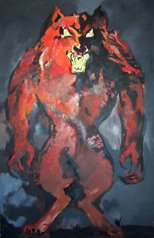Quotations from “City Boy”
Leonard Michaels
1933-2003 American
The words “thank you” sat in my brain like driven spikes.
—Leonard Michaels, “City Boy”
I discovered I was angry. Until she said that I had no idea I was angry. I flicked the cigarette into the gutter and suddenly I knew why. I didn’t love her.
—Leonard Michaels, “City Boy”
Love is infinite and one. Women are not. Neither are men.
—Leonard Michaels, “City Boy”
“Not say anything. Like moral imbeciles go slurp coffee and not say anything? What are we, nihilists or something? Assassins? Monsters?”
—Leonard Michaels, “City Boy”
Her eyes looked at mine. At them as if they were as flat and opaque as hers.... She continued looking at my eyes. I shrugged, looked down. She took my shirt front in a fist like a bite. She whispered. I said, “What?” She whispered again, “Fuck me.” The clock ticked like crickets. The Vlamincks spilled blood. We sank into the rug as if it were quicksand.
—Leonard Michaels, “City Boy”
Thursday, January 31, 2008
“The Battle of New Orleans”
from *Historic Poems and Ballads*
edited by Rupert S. Holland
American
At the same time that British armies were attacking Washington and Baltimore and a British squadron fighting that of Commodore Perry on Lake Erie in the War of 1812, England was fitting out a secret expedition to sail from Jamaica and land in Louisiana. Fifty British ships carried 7,000 British soldiers across the Gulf of Mexico to the channel near the entrance of Lake Borgne, approaching the small city of New Orleans midway between the Mississippi River and Mobile Bay. The fleet anchored there, and easily defeated a few American gunboats, landed their army on an island at the mouth of the Pearl River. They intended to march on New Orleans and capture it by surprise.
Andrew Jackson, a major-general in the American army, had been sent to defend the South from invasion. He reached New Orleans early in December, 1814, and at once began to recruit volunteers. All who would fight the enemy were welcomed to his camp, free negroes were enrolled, convicts were released to become soldiers, the lieutenants of a freebooter named Jean Lafitte, who had made his headquarters at Barataria, and many of his men who had been captured, were freed to join the army. Jackson strengthened the forts of the city and made every preparation to receive the enemy. Five thousand effective fighting men were soon under his command, less than one thousand of whom were soldiers in the regular army.
When the British finally appeared, it was they, and not the Americans, who were surprised. Jackson attacked them as soon as they were in sight, December 23, 1814, and checked their advance. He then entrenched his little force opposite the British, and had them well sheltered by the time the enemy had prepared to give battle. Meantime the British general, Pakenham, had been waiting for larger cannon and reinforcements.
On January 8, 1815, the British advanced, planning to carry the American lines by storm. The British had 10,000 veteran troops, the Americans less than half that number, and most of these raw backwoodsmen. But Jackson's men were born to the use of the rifle, and their firing was wonderfully steady and accurate. The British had to advance over a wide, bare plain, and the American batteries ploughed through their ranks, while the riflemen met them with a raking fire. The veteran English fought with the utmost bravery, the Highlanders flung themselves again and again at the entrenchments, and soldiers who had fought under Wellington in Spain and with Pakenham at Salamanca charged at the blazing line. Pakenham and many of his highest officers were killed, and the British army was finally forced to retreat. They had lost over two thousand men, while the Americans were reported to have lost eight killed and thirteen wounded. It was an overwhelming victory for Andrew Jackson and his volunteers.
The British returned to their ships and sailed away. Neither side knew that a treaty of peace had been signed at Ghent in Brussels two weeks earlier, and that the battle of New Orleans had been fought after the war had ended.
Posted by
Radigan Neuhalfen
at
03:49
0
comments
![]()
Labels: *Stories, *stories - flash, *stories - war, Rupert S. Holland
Friday, January 25, 2008
“You and I Are Sailing Towards the Sun”
M.Tsedendorj
1932-1982 Mongolian
You and I are sleeping on a cloud
You and I are sailing towards the sun
You and I pass over rivers and streams
You and I pass over gazing horses and animals
You and I pass over vast steppes and noble mountains
You and I pass over a wide road stretching into the distance
You and I pass over the singing of love songs
You and I are carried on a cloud, sailing towards the sun
You and I are sailing towards the sun
You and I are falling to Earth as rain
You and I make flowers with our juices
You and I are vaporizing, rising again into the sky
You and I are sleeping on a cloud
You and I are sailing towards the sun
Posted by
Radigan Neuhalfen
at
23:53
0
comments
![]()
Labels: *Poems, *poems - love, *poems - Mongolian, M.Tsedendorj
Sunday, January 13, 2008
Quotations
In literature, as in love, we are astonished at what is chosen by others.
—Andre Maurois
There are three rules for writing a novel. Unfortunately, no one knows what they are.
—W. Somerset Maugham
It took me fifteen years to discover that I had no talent for writing, but I couldn't give it up because by that time I was too famous.
—Robert Benchley
Posted by
Radigan Neuhalfen
at
11:05
0
comments
![]()
Labels: *Quotations, *quotations - love, *quotations - witticisms, *quotations - writing, Andre Maurois, Robert Benchley, W. Somerset Maugham
“Knockin Around”
Neil Lawful
1970- Irish
What I’ve been doing
Past couple of weeks
I don’t know a month or two
What I been doing
I really don’t I just don’t
know
Been filling in time nothing
Particular to do
Been taking my time
Just whiling away
Stumbling around unsure
This bumpy ground
Not sure where I’m going to
Lost just simply knockin
around.
Posted by
Radigan Neuhalfen
at
10:57
0
comments
![]()
Labels: *Poems, *poems - Irish, Neil Lawful
Saturday, January 5, 2008
Quotations
The ideal life is in our blood and never will be still. Sad will be the day for any man when he becomes contented with the thoughts he is thinking and the deeds he is doing -- where there is not forever beating at the doors of his soul some great desire to do something larger, which he knows that he was meant and made to do.
—Phillips Brooks
The reward of a thing well done is to have done it.
—Ralph Waldo Emerson
I can’t understand why a person will take a year to write a novel when he can easily buy one for a few dollars.
—Fred Allen
Posted by
Radigan Neuhalfen
at
13:29
0
comments
![]()
Labels: *Quotations, *quotations - witticisms, *quotations - writing, Fred Allen, Phillips Brooks, Ralph Waldo Emerson
“The Three Empties”
anonymous
Mongol
translated by Sh.Tsog and Simon Wickham-Smith
Though loud and shrill, an echo is empty.
Though darkly visible, a mirage is empty.
Though tangible, the dream is empty.
Posted by
Radigan Neuhalfen
at
13:20
0
comments
![]()
Labels: *Poems, *poems - Mongolian, anonymous, Sh.Tsog, Simon Wickham-Smith




